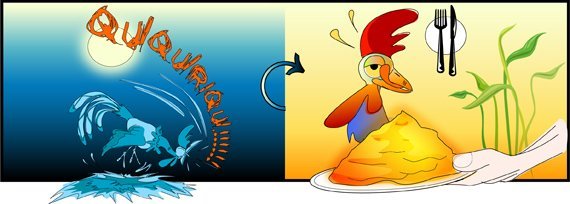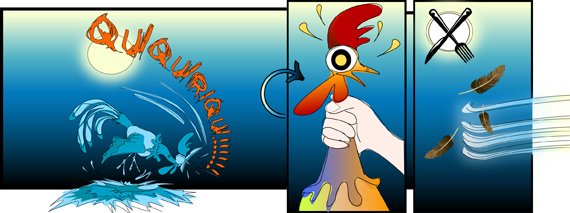| |
| |
 |
Bertrand Russell (1872-1970) es uno de los pensadores
más fecundos y universales del siglo XX: matemático,
lógico, autor polifacético, premio Nobel de
Literatura e influyente filósofo. Un pensador nada
convencional que recomendaba "no renunciar nunca a
mirar las cosas desde más de un punto de vista".
|
Siguiendo los pasos de su predecesor David Hume, cuestiona el
valor epistemológico del método inductivo. Los
procedimientos o métodos deductivos otorgan garantías
a las conclusiones obtenidas, es decir, lo que es válido
para todos, también lo es para una parte. Pero los procedimientos
o argumentaciones inductivas extraen conclusiones universales
a partir de datos u observaciones particulares, es decir, del válido
para una parte, más o menos representativa, se salta a válido
paral todo. Cuando argumentamos inductivamente, insinúa la
alegoría, ¿nos comportamos como los pollos?
|
|
| |
| |
|
It is obvious that if we asked why we believe
that the sun will rise tomorrow, we shall naturally answer,
"Because it always has risen every day." We have a firm belief
that it will rise in the future, because it has risen in the
past. If we are challenged as to why we believe that it will
continue to rise as heretofore, we may appeal to the laws of
motion. […]
 Experience has shown us that,
hitherto, the frequent repetition of some uniform succession
or coexistence has been a cause of our expecting the
same succession or coexistence on the next occasion. Food that
has a certain appearance generally has a certain taste, and
it is a severe shock to our expectations when the familiar appearance
is found to be associated with an unusual taste. […] Experience has shown us that,
hitherto, the frequent repetition of some uniform succession
or coexistence has been a cause of our expecting the
same succession or coexistence on the next occasion. Food that
has a certain appearance generally has a certain taste, and
it is a severe shock to our expectations when the familiar appearance
is found to be associated with an unusual taste. […]

A horse which has been often driven along a certain road resists
the attempt to drive him in a different direction. Domestic
animals expect food when they see the person who usually feeds
them. We know that all these rather crude expectations of uniformity
are liable to be misleading. The man who has fed the chicken
every day throughout its life at last wrings its neck instead,
showing that more refined views as to the uniformity of nature
would have been useful to the chicken.

But in spite of the misleadingness of such expectations, they
nevertheless exist. The mere fact that something has happened
a certain number of times causes animals and men to expect that
it will happen aggain.Thus our instincts certainly cause us
to believe that the sun will rise tomorrow, but we may be in
no better a position than the chicken which unexpectedly has
its neck wrung. We have therefore to distinguish the fact that
past uniformities cause expectations as to the future,
from the question whether there is any reasonable ground for
giving weight to such expectations after the question of their
validity had been raised.
RUSSELL. Problems of Philosophy
|
|
| |
| |
En nuestra vida cotidiana
todos hacemos uso de la inducción; los animales, también.
La inducción nos da seguridad psicológica;
pero no seguridad lógica. El pollo inductivista iba
incrementando su seguridad: cada vez que se le daba de comer, obtenía
una nueva confirmación de su convicción.
La inducción suele fundamentarse en la uniformidad o regularidad
de la naturaleza: la naturaleza no es caprichosa comportándose
ahora de una manera ahora de otra. Pero, ¿como se sostiene
esta uniformidad? Constatando que en el pasado o en un número
finito de casos ha sido uniforme o regular y que, por lo tanto (inducimos),
lo será siempre. Así, pues, se justifica el procedimiento
inductivo haciendo uso de un procedimiento inductivo; esta falacia
lógica se denomina petición de principio.
A pesar de todo, la inducción ayuda a adelantar en
nuestro conocimiento de la naturaleza. Las afirmaciones universales
que no podemos mantener inductivamente, las podemos proponer en
términos de probabilidad. Si habiendo observado diez
cisnes tenemos que abandonar nuestra afirmación "todos
los cisnes son blancos" puesto que hemos encontrado uno negro,
podemos afirmar que la probabilidad de que un futuro cisne sea blanco
es de 0,9.
|
|
| |
|


Experience has shown us that, hitherto, the frequent repetition of some uniform succession or coexistence has been a cause of our expecting the same succession or coexistence on the next occasion. Food that has a certain appearance generally has a certain taste, and it is a severe shock to our expectations when the familiar appearance is found to be associated with an unusual taste. […]